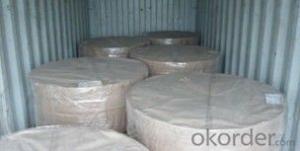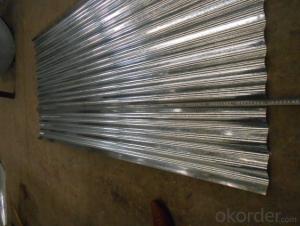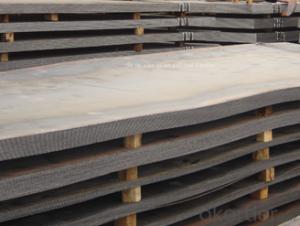Prepainted Galvanized Steel Coil With Best Quality
- Loading Port:
- Tianjin
- Payment Terms:
- TT OR LC
- Min Order Qty:
- 25 m.t.
- Supply Capability:
- 20000 m.t./month
OKorder Service Pledge
OKorder Financial Service
You Might Also Like
Product Name | Prepainted Galvanized Steel Coil With Best Quality |
Brand | CNBM |
Material | DX51D,CGCC,CGCH,CGLCC |
Thickness | 0.14mm-0.8mm |
Width | 750mm-1250mm |
Temper | Full hard,half hard,soft |
Inner Diameter of Coil | 508mm/610mm |
Coating | AZ30-AZ150,Z40-Z275g/m² |
Coil Weight | 2-5mt |
Paint(Top side) | 15-25micron |
Paint(Back side) | 5-10micron |
Color | Ral Chart,as per customer's color swatch |
Paints | PE; HDP; SMP; PVDF |
Application | Structural use ,roofing, commercial use,household appliance,industry etc. |
Package: | Waterproof paper+plastic film+iron packing+bundling,or as per customers request. |
Price terms | FOB,CFR,CIF or as your request |
Delivery time | Within 15-20 days after receipt 30% deposit or L/C at sight |
MOQ | 25 Mt (one 20ft FCL) |
3) Technical Specifications of PPGI steel coil>>>
Test Item | Standard | Result |
T Bend | NCCA11-19 | <3T |
Cupule Test | GB/T9753 | >8mm |
Impact(Shock Force J) | GB/T1732 | >9J |
Adhension(MEK) | GB/T9286 | ≥ 0 |
Pencil Hardness | GB/T6739 | >2H |
Gloss | GB/T1743 | <5% |
Chromatism(E) | ECCA T3 | E<5 |
MEK Scrub Resistance | MCCA11-18 | >100 |
Salt Spray Resistance | GB/T10125 | 500hr |
4) PPGI Prepainted Steel Coil Characteristic >>>
1.Pollution-free and economy
2.Extensive usability
3.Improvement of corporate image
4.Excellent workability, weatherability and elegant appearance.
1) PPGI Prepainted Steel Coil Introduction>>>
Color coated steel is a new prepainted steel product that develops rapidly in the last three decades,which are produced by coating a layer of paint on the surface of cold rolled,galvanized or galvalume coils.The products are made in the process of chemical pretreatment ,initial coating and refining coating by high-speed continuously manufacturing equipment. The coating quality is more smoother,mare stable and more ideal than th quality of brushing.
Color coated can keep the vivid color for a long time with excellent decoration,formability, corrosion resistance and coating adhesion.Color coated steel has become ideal construction material because of its efficient construction, energy conservation and depollution
· Standard: AISI, ASTM, BS, DIN, GB, JIS
· Grade: DX51D,CGCC,CGCH, CGLCC
· Thickness: 0.14mm-0.8mm
· Place of Origin: Shandong, China (Mainland)
· Brand Name: JNC
· Model Number: 0.14mm-0.8mm/750mm-1250mm
· Type: Steel Coil
· Technique: Cold Rolled
· Surface Treatment: Coated
· Application: Structural use ,roofing, commercial use,household appliance,industry
· Special Use: High-strength Steel Plate
· Width: 750mm-1250mm
· Length: Customized or as your request
· Zinc Coating: 40-275g/square meter
· Color: as RAL or as your request
· Trustworthy supplier: Prepainted Steel Coil/sheet
· Coil Weight: 2-5MT
· Paints: Standard Polyester(PE)
· Approved Certificate: ISO9001
· Quality: Top quality
· Test: Will test the products by the Third Part
· Temper: Full hard, half hard,soft
- Q:Do the steel sheets come in different finishes?
- Indeed, steel sheets are available in various finishes. Among the most frequently used finishes for steel sheets are brushed, polished, matte, satin, and textured. These finishes are attained through diverse methods, including grinding, sanding, or applying chemical treatments. The preferred finish is contingent upon the desired visual appeal, functionality, and intended purpose of the steel sheet. Diverse finishes can offer distinct degrees of luster, sleekness, or texture, thereby enabling customization and adaptability across a range of applications, including architectural, automotive, and industrial sectors.
- Q:Are the steel sheets suitable for outdoor applications?
- Yes, steel sheets are suitable for outdoor applications due to their durability, resistance to harsh weather conditions, and ability to withstand corrosion.
- Q:What are the bending and forming capabilities of steel sheets?
- Steel sheets have excellent bending and forming capabilities due to their inherent strength and malleability. They can be easily shaped into various forms, such as curves, angles, and complex geometries, through processes like bending, rolling, and stamping. This versatility makes steel sheets widely used in industries such as construction, automotive, and manufacturing.
- Q:How are steel sheets measured and sized?
- Steel sheets are measured and sized using various parameters such as thickness, width, and length. The thickness is typically measured in gauge or millimeters, while the width and length are measured in inches or feet. Additionally, steel sheets can be cut and customized to specific dimensions as per the requirements of the project or application.
- Q:What is the difference between stainless steel and regular steel sheets?
- Stainless steel and regular steel sheets have distinct differences in their composition and properties. Stainless steel is an alloy comprising iron, chromium, and other elements like nickel and molybdenum. In contrast, regular steel is predominantly made of iron with small amounts of carbon and impurities. The primary disparity between stainless steel and regular steel sheets lies in their corrosion resistance. Due to the presence of chromium, stainless steel exhibits high resistance to corrosion. When exposed to oxygen, chromium forms a protective layer called a passive film on the surface of the steel, preventing rust formation. This makes stainless steel suitable for applications in environments with moisture or chemical exposure. On the other hand, regular steel sheets are susceptible to corrosion as they lack the protective chromium layer. To enhance their corrosion resistance, they may require additional coatings or treatments. Without proper protection, regular steel sheets can rust and deteriorate when exposed to moisture or corrosive substances. Strength and hardness are additional distinguishing factors between stainless steel and regular steel sheets. Stainless steel, with its alloy composition, is generally stronger and more durable than regular steel. It can withstand higher temperatures and has better resistance to wear and tear. Regular steel, while strong, may not offer the same level of strength and durability as stainless steel. Aesthetic appeal is another contrasting aspect. Stainless steel sheets have a shiny, reflective surface, imparting a modern and sleek appearance. They are commonly used in architectural and decorative applications where visual appeal is desired. Regular steel sheets, on the other hand, have a more dull and matte finish and are primarily utilized for structural and industrial purposes rather than for their visual appeal. In conclusion, stainless steel sheets surpass regular steel sheets in terms of corrosion resistance, strength, and aesthetic appeal. They are the preferred choice for applications where durability, hygiene, and maintenance-free performance are essential, such as in kitchens, medical equipment, automotive parts, and construction projects. Regular steel sheets, although less expensive, may require additional protective measures and are commonly employed in structural and industrial applications where corrosion resistance and visual appeal are not primary concerns.
- Q:How are steel sheets tested for quality?
- Steel sheets are tested for quality through a variety of methods to ensure they meet the required standards. One of the most common tests is the tensile strength test, which measures the maximum amount of stress a steel sheet can withstand before it breaks. This test is crucial as it determines the durability and reliability of the steel sheet in various applications. Another important test is the hardness test, which measures the resistance of the steel sheet to indentation or scratching. This is done using specialized tools such as a Brinell or Rockwell hardness tester. The hardness test helps determine the steel sheet's ability to withstand wear and tear, making it suitable for specific applications. The thickness of the steel sheet is also checked using a micrometer or ultrasonic thickness gauge to ensure it meets the required specifications. This is important as the thickness affects the sheet's strength and ability to withstand external forces. Furthermore, visual inspection is conducted to identify any surface defects, such as cracks, pits, or corrosion. This is done by trained professionals who carefully examine the steel sheet for any irregularities that might compromise its quality. Chemical composition analysis is another crucial test that determines the percentage of various elements present in the steel sheet. This analysis is performed using techniques like spectrometry or X-ray fluorescence to ensure the steel sheet meets the desired chemical requirements. Additionally, steel sheets may undergo tests such as impact testing, bend testing, and fatigue testing to assess their performance under specific conditions. These tests simulate real-world scenarios to ensure the steel sheet can withstand the anticipated loads and stresses it may encounter. Overall, steel sheets are rigorously tested for quality to ensure they meet the necessary standards, providing customers with reliable and durable products. These tests help manufacturers identify any potential flaws or defects, allowing them to rectify issues and deliver high-quality steel sheets to the market.
- Q:What is the typical lifespan of painted steel sheets?
- The typical lifespan of painted steel sheets can vary depending on several factors such as the quality of the paint used, the environmental conditions they are exposed to, and the maintenance and care given to the sheets. Generally, painted steel sheets can last anywhere from 20 to 40 years. However, if the paint is of high quality and the sheets are properly maintained, their lifespan can be extended even further. Regular cleaning, inspection for any signs of damage or corrosion, and appropriate touch-ups or repainting can help prolong the lifespan of painted steel sheets. Additionally, factors such as exposure to harsh weather conditions, chemicals, or corrosive environments can also impact the longevity of painted steel sheets. It is worth considering these factors and conducting regular maintenance to ensure the extended lifespan of painted steel sheets.
- Q:Can steel sheets be used for agricultural fencing or enclosures?
- Yes, steel sheets can be used for agricultural fencing or enclosures. They are durable, strong, and provide excellent security. Steel sheets can be welded or fastened together to create a sturdy barrier that can withstand the elements and keep livestock contained. Additionally, steel sheets can be easily customized to suit specific fencing or enclosure requirements.
- Q:Can steel sheets be used for elevator cabins?
- Yes, steel sheets can be used for elevator cabins. Steel is a common material choice for elevator cabins due to its strength, durability, and fire resistance properties. Steel sheets can be fabricated to create a sleek and modern look for elevator cabins, and they can also be easily customized to fit specific design requirements. Additionally, steel is a cost-effective option for elevator cabins as it is readily available and has a long lifespan.
- Q:Can steel sheets be used in the construction of bridges?
- Indeed, the utilization of steel sheets in the construction of bridges is possible. Due to its numerous beneficial characteristics, steel has become a prevalent material in bridge construction. Owing to their exceptional strength and durability, steel sheets are well-suited for enduring substantial loads and adverse weather conditions. Furthermore, their flexibility facilitates simpler fabrication and installation processes. Moreover, the ease with which steel sheets can be welded or bolted together makes them highly suitable for the construction of expansive structures such as bridges. In conclusion, steel sheets provide a dependable and cost-effective solution for bridge construction.
1. Manufacturer Overview |
|
|---|---|
| Location | |
| Year Established | |
| Annual Output Value | |
| Main Markets | |
| Company Certifications | |
2. Manufacturer Certificates |
|
|---|---|
| a) Certification Name | |
| Range | |
| Reference | |
| Validity Period | |
3. Manufacturer Capability |
|
|---|---|
| a)Trade Capacity | |
| Nearest Port | |
| Export Percentage | |
| No.of Employees in Trade Department | |
| Language Spoken: | |
| b)Factory Information | |
| Factory Size: | |
| No. of Production Lines | |
| Contract Manufacturing | |
| Product Price Range | |
Send your message to us
Prepainted Galvanized Steel Coil With Best Quality
- Loading Port:
- Tianjin
- Payment Terms:
- TT OR LC
- Min Order Qty:
- 25 m.t.
- Supply Capability:
- 20000 m.t./month
OKorder Service Pledge
OKorder Financial Service
Similar products
New products
Hot products
Related keywords






























